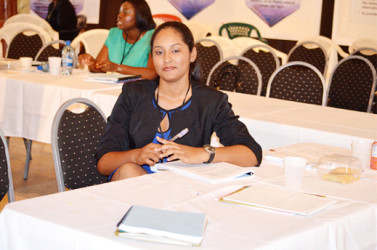Archaeologist Louisa Daggers has embarked upon what she hopes will be ground-breaking research into the diet of prehistoric Guyanese.
Daggers is one of nine faculty members who were given grants this year by the Ministry of Education (MoE), under the World Bank-funded US$10M Science and Technology Support Project’s Education Quality Improvement Programme. The project is expected to provide 40 grants over the next five years in support of more applied research towards meeting the critical needs of the Low Carbon Development Strategy (LCDS).
Daggers, a former Administrator at the Walter Roth Museum and current lecturer in the Department of Language and Cultural Studies, at the Faculty of Education and Humanities, is intent upon her quest to “set the benchmark of Guyana’s carbon footprint 7,000 years ago and then chronologically map a breakdown of how our carbon footprint changed overtime.”

Her co-researcher is Dr. Mark Plew, professor of applied archeological science at Boise State Graduate School, where she completed her masters. This collaborating will see Daggers and her team utilising the laboratory and other facilities of the foreign university to conduct isotopic analysis and carbon dating of faunal and human remains from areas within regions One and Two, including little Kaniballi on the Waini River, Waiwa Creek and the Pomeroon at places such as Kabakaburi, and possibly Baramita.
Explaining that the archaic period was marked by a lot of climatic shifts, Daggers noted that previous research on prehistoric human remains from Guyana has shown that prehistoric civilization adapted to that climate and were able to live very healthy lives,
She, along with her team, which will include students from the university’s Department of Language and Cultural Studies as well as persons from the MoE’s Department of Culture and members of communities surrounding the proposed excavation sites, intend to clearly ascertain the factors which sparked the survival mechanisms of prehistoric Guyanese civilization. They also intend to determine how these people went about selecting foods and what they were doing to have a thriving operation.
The Research Grant, according to Daggers, opens avenues to allow for wider research in a field she has been examining for years. “We’ve been doing similar studies for years but not on a large scale, real research is needed for concrete generalizations,” she said.
The findings of this research would mean that “Guyana we will be more aware, [it will] let Guyanese people know how everyday activity impact our atmosphere and our wellbeing and show us how to utilize resources more effectively and monitor our way of life” Daggers explained.
Daggers’ research is expected to begin this month and conclude in December of 2016.





